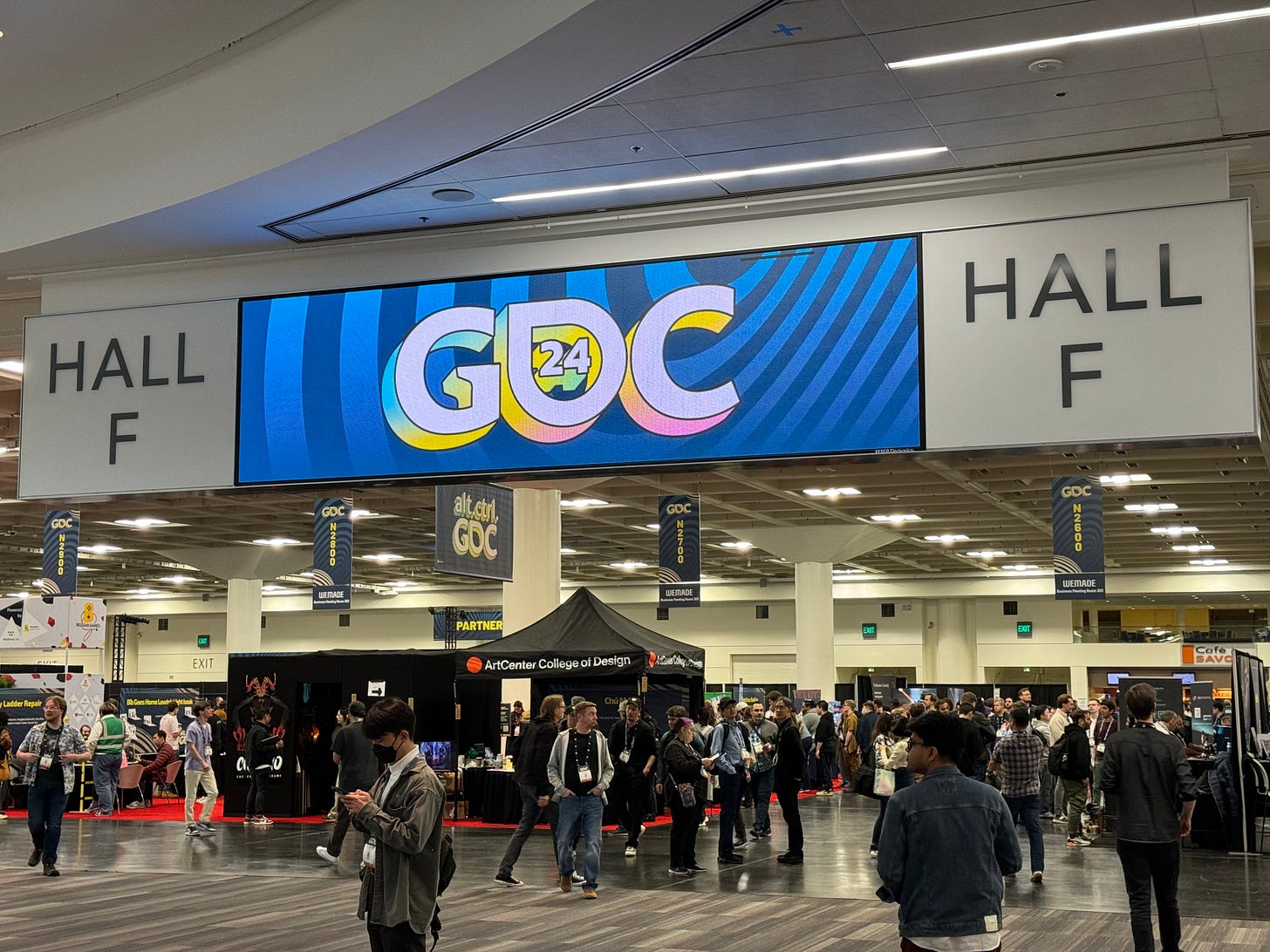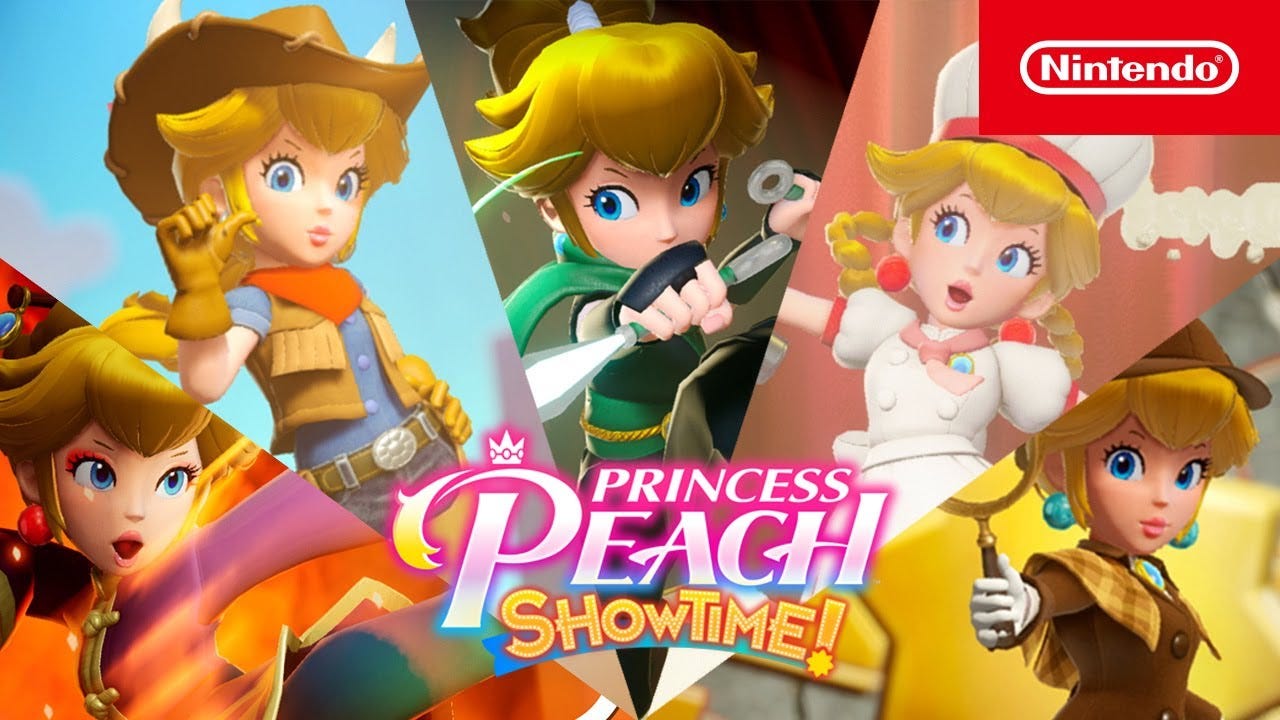Five lessons from Game Developers Conference: Video Games Industry Memo, 21/03/2024
Game tales of San Francisco
This week’s Video Games Industry Memo is sponsored by Sumo Digital
I found out five things at the Game Developer Conference (and nothing else, I swear)
UK ad body reprimands EA, Miniclip and Jagex over loot boxes
It’s showtime for Princess Peach in this week’s game releases
Good morning VGIM-ers,
Welcome to the first edition of the newsletter that has been written from foreign shores.
I’m writing this introduction on a sunny Sunday afternoon in San Francisco’s marina district, while I struggle to understand how it costs upwards of ten bucks for a single pint of Guinness here.
We’ll dive into the rest of the newsletter shortly. For now though, I have two quick things for you.
First, the schedule for the London Developer Conference (that’s LDC, not GDC) has gone onto the ol’ Interwebs and I’m delighted to say that we have secured ourselves a cracking headline speaker.
Keza MacDonald, Games Editor at The Guardian, will be sitting down with me for a chat about the state of play in the games industry, to discuss how the paper covers the medium and provide some sneaky tidbits about her forthcoming book Super Nintendo which will be out later this year. Purchase your pass to our Savoy Place bash on Thursday 11th April here.
And second, the Playing for the Planet Alliance, facilitated by the United Nations Environment Programme, publishes its Annual Impact report later today and I’m pleased to say that I helped write it.
VGIM readers can get an early look at the report, which summarises how the alliance of video games businesses performed against its goal of supporting positive change in the global environmental agenda, here.
Oh and as one bonus thing to throw into the mix, you can also pay me to write stuff for you too. Email me at videogamesindustrymemo@substack.com if you’d like to find out more (I am reassuringly expensive, promise).
Anyway, enough of that. Shall we see how coherently I can write after a week of conference mayhem?
The big read - Five lessons from Game Developers Conference
Game Developers Conference, aka GDC, is the biggest games business event in the world.
The annual industry get together brings together the best part of 30,000 video games professionals to talk shop, do deals and not very subtly worry about how close their hotel is to the Tenderloin.
GDC is a key part of the industry calendar, driving forward the sector’s commercial agenda for the year.
It is also an excellent time to learn stuff both through the official talks and resources and - much more entertainingly - through the sharing of weapons-grade gossip at the conference’s baffling array of social events.
So here are five things that I picked up from this year’s event that I thought were worth sharing with you.
Use of generative AI is splitting industry opinion
Every year, GDC opens with the publication of a very useful State of the Industry survey that offers a window into the thoughts of over 3000 industry pros.
The report is always an interesting read for industry watchers and well worth flipping through in its entirety. But my eye was particularly drawn to an emerging industry divide over the use of generative AI within the workplace.
I was genuinely surprised to discover that nearly half of people working in the games industry say that they, or someone in their team, is using the tech in their working lives.
31% of survey respondents reported that they were personally using a generative AI tool such as ChatGPT, Dall-E, GitHub Copilot or Adobe Firefly, while a further 18% reported that they don’t use these tools but colleagues do.
But the extent to which generative AI is being used for work depends on which part of the industry you’re in.
It’s being used pretty extensively in commercial contexts, with 44% reporting that they used generative AI for business and finance purposes, 41% for community management, marketing and PR functions and 33% in production and team management roles.
By contrast, frontline game developers appear to be comparatively hesitant to use generative AI in their day jobs. Only 25% of respondents were using these tools in programming and engineering contexts, 21% within game design and just 6% use it for quality assurance purposes.
Unfortunately, there isn’t much of an explanation for this divide. The survey did find that four fifths of game developers reported that they had concerns over the ethical deployment of generative AI within the making of games.
It didn’t, however, ask precisely how generative AI is being used within each function (e.g. are PR pros mostly using Chat-GPT for press releases or using an image tool to create marketing assets?) or what particularly led to concerns about its ethical usage; leaving us frustratingly short of information for now.
Nevertheless, it suggests that there’s a gap emerging in how generative AI is used within the business and development side of games: setting the stage for the emergence of a new divide in the creation and commercialisation of games content.
The US games jobs market is grim
My GDC week opened at Pocket Gamer Connects: San Francisco, where I hosted a roundtable about how people can bounce back from the layoffs that have led to 18,000 job losses in the global industry in the past 12 months.
And while the roundtable participants were a delight to speak to over the course of the hour, their assessment of the US games industry job market in particular was bleak.
The majority of the conversation, which was driven by insight from Olga Sheverieva and Rumiko Matsumoto (as well as perceptive thoughts from the audience), focused on the ‘grim’ impact of layoffs on the industry’s mood, as well as on the people and communities that form the American games sector.
The consensus within the room was that layoffs had deeply impacted developers across the whole country, that there was little hope of a rapid return to hiring and that this wave of layoffs will likely both eject senior talent from the industry for good and block pathways to new entrants.
This perspective was underpinned by anecdotes that illustrated the widespread pain that layoffs have caused.
One attendee shared that their local industry meetup had become “a support group”, with organisers introducing a stickering system to help people quickly signal to others if they had been affected by layoffs to both reduce awkwardness and help people calibrate conversation accordingly.
One of the roundtable attendees was - utterly disgracefully - laid off while seven months pregnant and had to suddenly battle to try to find a short term bridging role to support themselves through the birth of their child.
And another person who spoke in the session said that they felt conflicted about recommending the video games industry as a place to work, despite heading up an organisation aimed at improving representation within the sector.
The group, to their credit, still suggested plenty of ways for job searchers to make the most of a tough situation.
This included crafting a CV that properly played to your strengths, having the confidence - even in tough times - to take a targeted approach to applications and looking at roles that are adjacent to games (such as finding businesses using Unreal Engine within the enterprise world) to find a way through the crisis.
But with market conditions unlikely to change quickly, the “survive to 2025” mantra feels less like industry gallows humour and more a stinging reflection on industry reality stateside.
We need to respectfully celebrate success
Times are undoubtedly tough right now. But that doesn’t mean that we shouldn’t be taking a moment to respectfully mark successes that remind us that, hey, people do still love video games.
Balatro is a prime example of how to do this. The poker inspired roguelike created by mysterious one person dev team LonelyThunk has been one of the breakout hits of 2024, selling a million copies in a little under a month.
But when I spoke with Aaron Ludlow, the Product Director at PlayStack (the publisher backing Balatro), it was clear that they felt it was important to acknowledge their success in an even handed way.
“We had a chat internally about tone and the success we’ve had because it’s tough at the moment. We’ve got friends who work at PlayStation London Studio, Supermassive and some of the other studios affected by layoffs too. So we want to come across as understanding because what’s going on has been terrible.”
“But at the same time, we do want to say it is possible to have hits, it isn’t all doom and gloom and it’s still a great industry to work in.”
It’s a tricky tightrope to walk but I am glad that companies are sensitively starting to toe their way across it. Industry morale may be low at the moment and nobody wants to hear anyone gloat when many are struggling.
But finding time to temperately celebrate success is important for dusting ourselves off after the bad times and to help us identify what good looks like in the next phase of the industry.
The UK games industry is revolting (politically speaking)
The UK games business had a surprisingly good relationship with the Conservative Party over the past decade.
Despite the obvious mismatch between the sector’s liberal/lefty political leanings and the Tory’s Darth Vader tendencies, the two built a broadly constructive relationship based on the sector’s ability to crack on and grow with targeted - but comparatively limited - funding and policy support from the political centre.
Judging from what I’ve heard this week, however, the marriage of convenience looks to be ending in an acrimonious divorce.
The Government’s bonkers approach to limiting ‘skilled’ immigration post Brexit, the perception that it sneakily weakened industry tax reliefs through the introduction of a less useful expenditure credit this year and half a decade of trench warfare over loot boxes definitely irritated the sector.
But the decision of Jeremy Hunt, the country’s Chancellor of the Exchequer, to overlook the games industry completely in the most recent Budget (despite popping a billion quid of support into other creative industries and using the sector for some handily timed photo ops) appeared to be the final straw for many.
I even heard some of the industry’s more traditionally diplomatic and constructive figures participating in the country’s official trade mission calling for regime change during some surreptitious shop talk, suggesting that the (Conservative) party is well and truly over.
Of course, video games policy will not be the reason the Conservatives are kicked to the curb by the country later this year. And while I obviously enjoy nerding out about it, the topic won’t be worth more than a line or two in any party’s manifesto.
But the industry’s irritation with the political landscape feels much sharper than it has been for some time - suggesting that it is prepared to adopt a more aggressive lobbying position whoever ends up in charge by the end of the year.
Tackling toxicity requires leadership
The rumblings of Gamergate 2.0 continued last week, with the Extremism and Research Gaming Network - featured in previous VGIMs - subjected to an idiotic (but impactful) ‘exposè’ on social media by an online conspiracy theorist who was less Lester Freamon and more Less Attached To Reality.
Yet despite these worrying murmurs returning to the fore, and newly published research from Deloitte indicating that over half of players believe the industry isn’t doing enough to tackle toxicity within its games, companies and leaders have remained notably quiet on the topic.
In some senses, this is understandable. Toxicity is a tricky thing to define and there is a level of subjectivity over what exactly games businesses do need to moderate within their community. In these circumstances, the ‘safest’ thing to do is to shut up: foregoing a possible leadership role for the security of keeping quiet.
There’s also a genuine concern amongst games businesses that revealing precise tactical interventions to tackle toxic, extreme or illegal behaviour could prove unintentionally harmful by helping bad actors to circumvent issues.
However, one person at the conference reminded me of a recent comparison made on these pages in regards to professional football (soccer, for our US readers) in the UK.
Harmful behaviour and toxic activity remains an issue at football grounds. But a sustained push by the sport to build safer stadiums, increase the safety of fans and reduce hate in grounds following a series of devastating stadium disasters in the late 1980s significantly reduced toxicity in football over the course of three decades - delivering a healthier, and more commercially successful product, in the process.
Games companies need to tackle the problem with a similar mindset and in a similar manner. There’s already evidence that they will be rewarded if they do, with Rachel Kowert of Take This telling me yesterday that the organisation has conducted research which shows that players spend 54% more per month in games that they deem to be non-toxic compared to those that don’t.
And while there’s no quick and easy solution for this, there’s a strong argument that now is the time for senior leaders to make tackling toxic communities a priority, to push this agenda publicly through company communications and ensure it is embedded into business practices to protect the medium’s positive future.
News in brief
Pop a CAP in your ASA: The UK Advertising Standards Authority has upheld complaints against EA, Jagex and Miniclip for failing to properly disclose the presence of loot boxes in their games via digital adverts in line with Committee of Advertising Practice (CAP) guidance. Three things to note: all of the businesses received slaps on the wrist by the ASA, but Jagex was the only one to push back hard against censure; a total of four companies have been reprimanded by the ASA for their loot box disclosure practices in adverts since their introduction in 2022; all of the complaints have been raised by a single academic interested in loot box regulation, not by members of the public.
EU’re growing on me: The European Institute of Innovation and Technology released the findings of research commissioned by Finnish trade body neogames into the sector’s future on the continent. The report challenges the games industry to reach a 40 billion Euro turnover by 2030 and outlines a number of ways to achieve it including strengthening national trade associations, increasing access to risk capital for growth and ensuring the continent’s skills agenda helps the sector to develop the right talent locally.
Ro-boom-blox: Universal Music Group and Republic Records have announced a product called Boombox, which will allow music streamed via Roblox experiences to count towards the Billboard charts in the US. The feature is being launched in the Twice Square experience based on the popular K-pop group and aims to roll out across Roblox in due course.
Selldivers: Surprise multiplayer hit Helldivers 2 has sold over 8m copies since its launch in early 2024, according to Bloomberg analyst Doug Creutz. The projected sales figure reflects the success of the game as a joint PlayStation and Steam multiplayer launch, with the game’s recent concurrent players peak of 458,000 demonstrating its widespread popularity.
Tim Sweary: And finally, last week’s VGIM came out just before news emerged that Tim Sweeney called senior leaders at Valve “assholes” in a feisty email exchange prior to the launch of Epic Games’s PC Store. The company also announced that its mobile store will arrive on Android and iOS by the end of the year but that’s a lot less funny to write about than childish name calling.
A message from our sponsor: Sumo Digital premieres “DEATHSPRINT 66”, Sumo Newcastle's on-foot racing gameshow; and reveals *new* news for The Chinese Room's “Still Wakes the Deep” at the Future Games Show later today.
On the move
Marc Allera is the new Chair of the board at Jagex…Ago Simonetta has popped up as Chief Commercial Officer at GSC Game World…Blandine Prost is the new Development Director at Keywords Studio…And Chris Garratty has been promoted to Director, Legal at Activision Blizzard King…
Jobs, jobs, jobs
Two Point Studios is hiring a Senior Producer…Fandom is snapping up an Associate Commerce Editor in San Francisco…Netflix is recruiting for a Senior Technical Artist for its Blue Studio and is practically double daring you to ask for the $600k its offering at the upper end of its salary range…Jagex is looking for a new Creative Lead in Cambridge (hopefully not because of that ASA ruling)…And Tencent is hiring for a (Senior) Localisation Producer in Paris even though the job title suggests it hasn’t quite decided how senior they’ll actually be…
Events and conferences
Mobile Games Intelligence Conference, London - 27th March
London Games Festival, London - 9th-25th April
London Developer Conference, London - 11th April
BAFTA Games Awards, London - 11th April
Reboot Develop Blue, Dubrovnik - 22nd-24th April
Games of the week
Princess Peach: Showtime! - Nintendo’s outfit switching Princess Peach game set to inspire an entire generation of cosplayers from Friday.
Alone in the Dark - Reboot of classic horror game brings Jodie Comer and David Harbour along for the ride because, y’know, why not?
Call of Duty: Warzone Mobile - Portable version of COD’s battle royale finally drops worldwide after a lengthy Australian soft launch.
Before you go…
I have a short note regarding next week’s VGIM.
I am on holiday from the end of this week until after the Easter break because my brain feels like it has melted and glued itself to the inside of my skull.
This means you will still get a newsletter next week but it will be a little bit different - and be slightly slimmer - than what you usually receive.
Yes, I know you’re disappointed. But at least it’s better than me accidentally putting on a poorly chosen VGIM re-run, isn’t it?









Great stuff as always, George. I'd love you to do a deep dive with people on Generative AI. From my experience there are clear answers in the divide between "non" dev roles (not to open that can of worms) and more traditional development roles, that you could could run interesting interviews on!